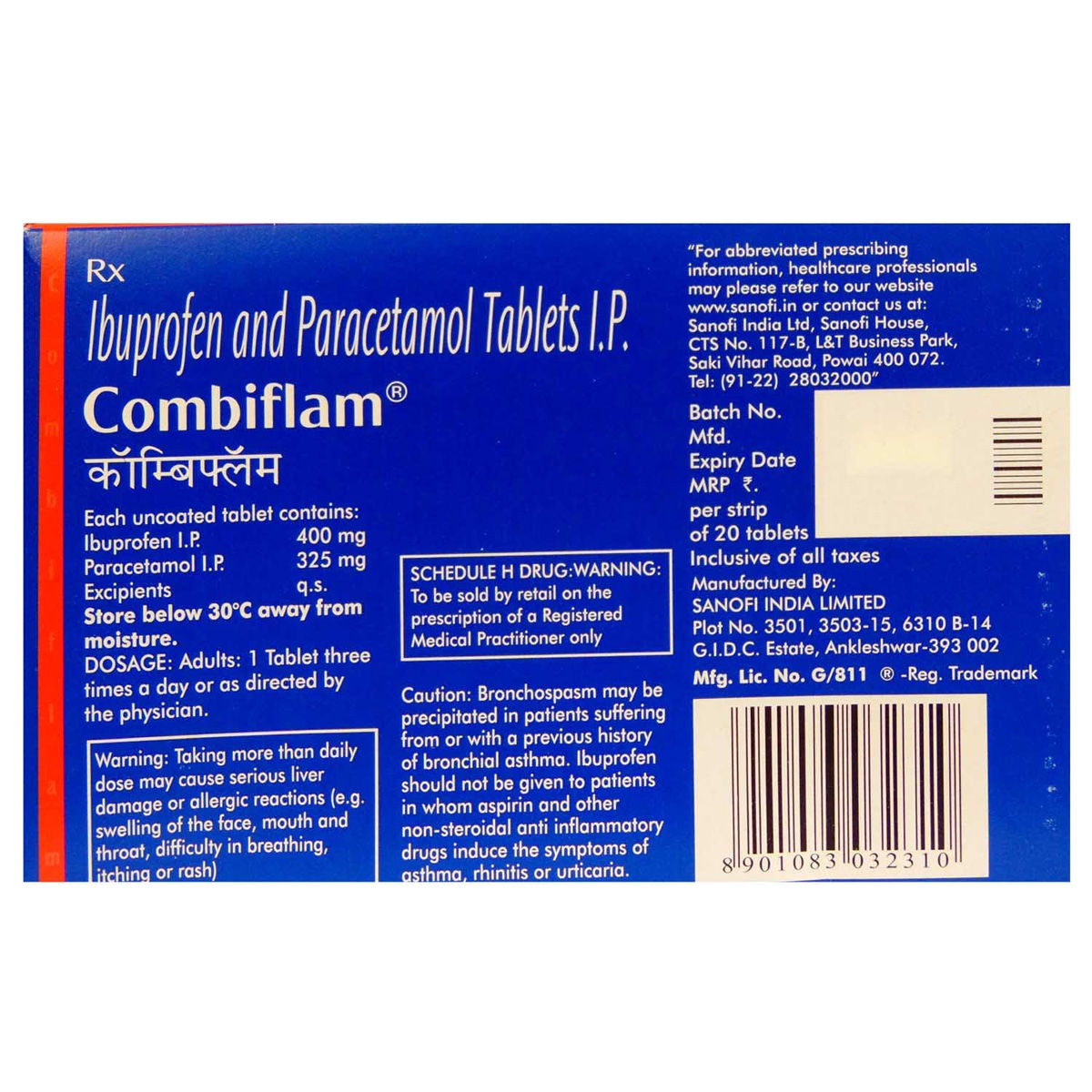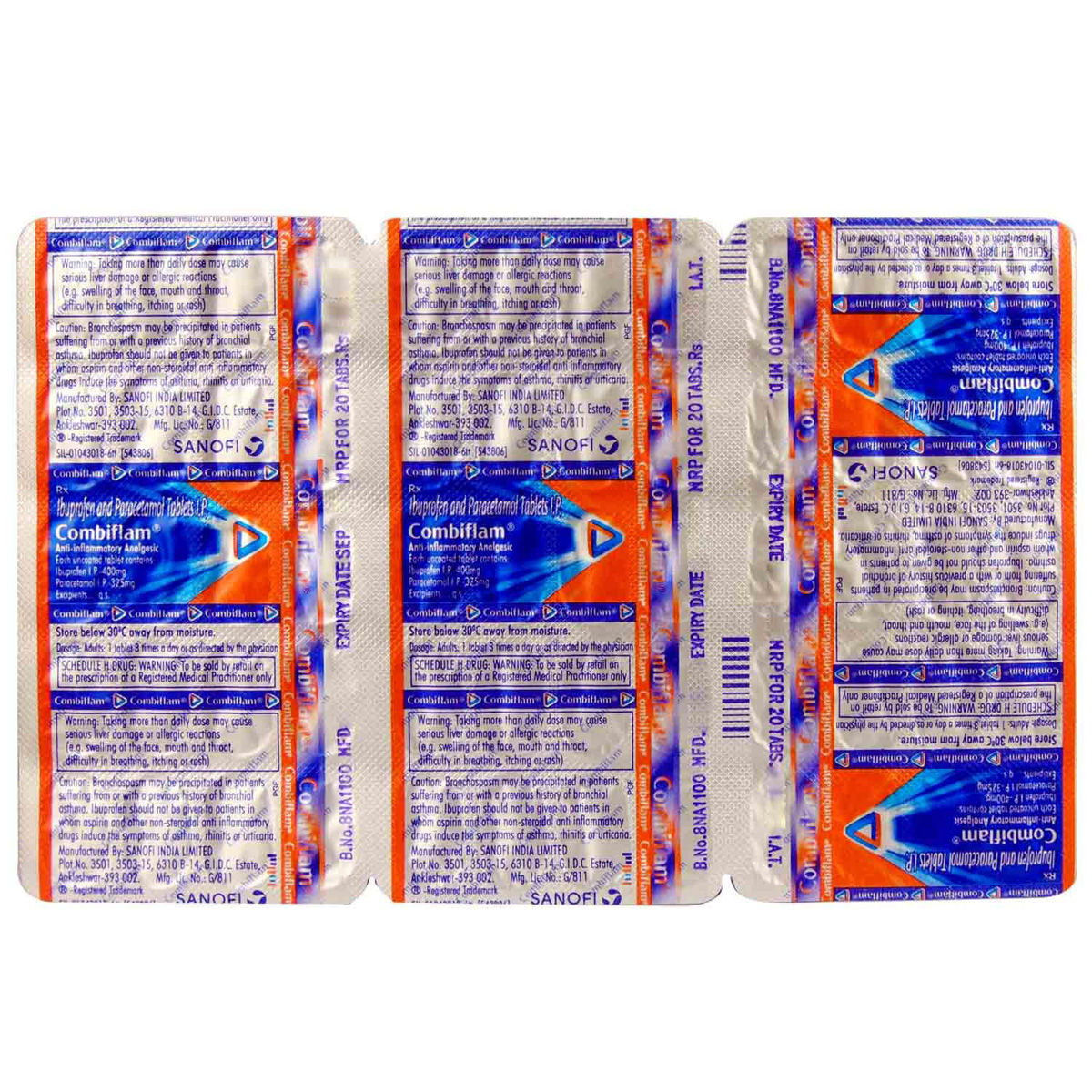Combiflam Tablet 20's




₹50*
MRP ₹55.5
10% off
₹47.17*
MRP ₹55.5
15% CB
₹8.33 cashback(15%)
Free Delivery
With Circle membership
(Inclusive of all Taxes)
This offer price is valid on orders above ₹800. Apply coupon PHARMA10/PHARMA18 (excluding restricted items)
Combiflam Tablet is used to relieve symptoms of muscle pain, arthritis pain, dysmenorrhea (painful periods or menstrual cramps), and dental pain and reduces fever. Besides this, it is also useful for dental pain, which can occur due to damage to the tooth nerve, infection, decay, extraction or injury. It contains Ibuprofen and Paracetamol, which works by blocking the effect of a chemical known as prostaglandin, responsible for inducing pain and inflammation in our body. Also, it lowers the elevated body temperature and help to reduce mild to moderate pain in a shorter duration. It may cause side effects such as tightness of the chest, breathing difficulties, fever, skin rashes, increased heart rate and or in case of any signs of hypersensitivity. Before taking this medicine, you should tell your doctor if you are allergic to any of its components or if you are pregnant/breastfeeding, and about all the medications you are taking and pre-existing medical conditions.
Know Your Delivery Time
Provide Delivery Location
Available Offers
 Prescription drug
Prescription drugWhats That
 625 people bought
625 people bought 
Secure Payment

India's Most Trusted Pharmacy

Genuine Products
Composition :
Manufacturer/Marketer :
Consume Type :
Return Policy :
Expires on or after :
About Combiflam Tablet
Combiflam Tablet is used to relieve symptoms of muscle pain, arthritis pain, dysmenorrhea (painful periods or menstrual cramps), and dental pain and reduces fever. Pain can be temporary (acute) or long-lasting (chronic). Acute pain is, for a short time, caused by damage to the tissues of the muscle, bone, or other organs. In contrast, chronic pain lasts for a long duration and is caused by pathologies like nerve damage, osteoarthritis, etc. Besides this, it is also useful for dental pain, which can occur due to damage to the tooth nerve, infection, decay, extraction or injury.
Combiflam Tablet is composed of two medicines, namely Ibuprofen and Paracetamol. Ibuprofen is known to have an analgesic and anti-inflammatory effect for reducing mild to moderate pain. It works by blocking the effect of a chemical known as prostaglandin, responsible for inducing pain and inflammation in our body. Paracetamol acts as a mild analgesic and antipyretic (fever reducer). It lowers the elevated body temperature and mild pain by inhibiting the synthesis of a chemical messenger (prostaglandin) and promoting heat loss (through sweating) that helps reset the hypothalamic thermostat. Together, these two medicines help reduce mild to moderate pain in a shorter duration.
Like all medicines, Combiflam Tablet may cause side effects, although not everybody gets them. Stop taking this medicine if you experience symptoms like tightness of the chest, breathing difficulties, fever, skin rashes, increased heart rate and or in case of any signs of hypersensitivity.
Do not take Combiflam Tablet if you are allergic to painkillers like aspirin, ibuprofen, naproxen, or diclofenac. It is not recommended for use in children, people with liver disease, heart disease or gastric ulcers/bleeding problems. Combiflam Tablet may be associated with a small increase in the risk of heart attack (myocardial infarction). Avoid consumption of alcohol as it may damage your liver and cause increased side effects on taking this drug. Consult your doctor if your pain, inflammation, and fever symptoms do not disappear even after ten days.
Uses of Combiflam Tablet
•Pain Relief: Combiflam Tablet is widely used to alleviate mild to moderate pain, such as headaches, toothaches, menstrual cramps, and muscle aches.
•Fever Reduction: Combining Ibuprofen and Paracetamol, Combiflam Tablet effectively reduces fever caused by infections or other health conditions.
•Anti-inflammatory Benefits: Its anti-inflammatory properties make Combiflam Tablet valuable for managing inflammation and swelling in conditions like arthritis and other inflammatory diseases.
•Post-Surgical Pain Management: Combiflam Tablet is often prescribed to manage pain and discomfort following surgical procedures, aiding recovery.
•Managing Chronic Pain: Combiflam Tablet is sometimes included in chronic pain management plans, particularly for conditions like osteoarthritis or persistent back pain, under a healthcare professional's supervision.
Directions for Use
Tablet: Use Combiflam Tablet as prescribed by your doctor. Take Combiflam Tablet with food to avoid stomach upset, and swallow the whole tablet with a glass of water. Do not break, crush or chew it.
Medicinal Benefits
Combiflam Tablet comprises Ibuprofen and Paracetamol primarily used to treat mild to moderate pain. Combiflam Tablet is prescribed mainly to treat pain and relieve discomfort caused by conditions like tooth pain, arthritis, period pain and other types of short-term pains. It helps treat pain by blocking the chemical messenger (prostaglandin) in the brain responsible for causing pain. Ibuprofen works by blocking the effect of a chemical known as prostaglandin, responsible for inducing pain and inflammation in our body. On the other hand, Paracetamol lowers the elevated body temperature and mild pain by inhibiting the synthesis of prostaglandin by promoting heat loss (through sweating) that helps reset the hypothalamic thermostat. Paracetamol has the advantage of producing less gastric irritation than other painkillers like aspirin.
How Combiflam Tablet Works
Storage
Side Effects of Combiflam Tablet
- Nausea
- Vomiting
- Diarrhoea
- Flatulence
- Constipation
- Thrombocytopenia (low level of platelets)
- Neutropenia/leucopenia (low white blood cells)
- Skin rashes (urticaria)
- Peptic ulcers
- Gastrointestinal bleeding
- Dyspepsia
- Abdominal pain
- Colitis (inflammation of the intestine)
- Inflammatory bowel disorder
What if I have taken an overdose of Combiflam Tablet
Drug Warnings
Caution is advised in people with underlying sensitivity to aspirin and other pain killers. Combiflam Tablet is contraindicated in children below 12 years of age under 40 kg of weight. If treatment is required for more than three days, consult your doctor. Combiflam Tablet should be taken with caution if you have an allergy to paracetamol, ibuprofen, aspirin, or other pain killers, highly sensitive reactions (asthma, lip/face/throat swelling), existing stomach ulcer or bleeding associated pain killers, blood clotting disorder, heart diseases (like congestive heart failure), kidney disease, peptic ulcer, another active bleeding (like brain stroke bleeding), and severe dehydration (due to vomiting, diarrhoea). Liver damage might occur if taken for a longer duration as it contains paracetamol. The skin should be closely monitored as skin allergic reactions like Stevens-Johnson syndrome (SJS), and toxic epidermal necrolysis (TEN) have been reported with Combiflam Tablet . Blood pressure and cardiovascular (heart) status should be monitored closely during the treatment with Combiflam Tablet , especially in people affected with high blood pressure and who have a history of heart failure.
Drug-Drug Interactions
Drug-Drug Interactions
Login/Sign Up
Combining Meloxicam and Combiflam Tablet can increase the risk of side effects in the gastrointestinal tract such as inflammation, bleeding, ulceration, and rarely, perforation.
How to manage the interaction:
Taking Meloxicam and Combiflam Tablet together is not recommended as it can lead to an interaction, it can be taken if advised by your doctor. However, if you experience any symptoms like dizziness, lightheadedness, red or black, dark stools, coughing or vomiting fresh or dried blood that looks like coffee grounds, severe headache, and weakness, consult the doctor immediately. Do not stop using any medications without a doctor's advice.
Taking Ketorolac and Combiflam Tablet can increase the risk of side effects in the gastrointestinal tract such as inflammation, bleeding and ulceration.
How to manage the interaction:
Taking Ketorolac and Combiflam Tablet together is not recommended as it can lead to an interaction, it can be taken if advised by your doctor. However, if you experience any symptoms like dizziness, lightheadedness, red or black, dark stools, coughing or vomiting fresh or dried blood that looks like coffee grounds, severe headache, and weakness, consult the doctor immediately. Do not stop using any medications without a doctor's advice.
Use of Piroxicam with Combiflam Tablet can increase the risk of side effects such as inflammation(swelling with redness and pain), bleeding, ulceration.
How to manage the interaction:
Co-administration of Piroxicam and Combiflam Tablet can lead to an interaction, it can be taken if advised by a doctor. However, if you experience any symptoms like unusual bleeding or bruising, dizziness, lightheadedness, red or black, tarry stools, coughing up or vomiting fresh or dried blood that looks like coffee grounds, severe headache, and weakness, consult the doctor immediately. Do not stop using any medications without a doctor's advice.
The combined use of Pralatrexate and Combiflam Tablet can increase the risk of blood levels and side effects of Pralatrexate.
How to manage the interaction:
Co-administration of Pralatrexate and Combiflam Tablet can lead to an interaction, it can be taken if advised by your doctor. However, if you experience any symptoms like mouth ulcers or sores, vomiting, diarrhea, rash, loss of appetite, joint pain or swelling, yellow discoloration of skin and eyes, dark urine, paleness, dizziness or fainting, unusual bruising or bleeding, infection, and flu-like symptoms (fever, chills, body aches, sore throat, muscle weakness), consult the doctor immediately. Do not stop using any medications without a doctor's advice.
The combined use of Leflunomide and Combiflam Tablet can increase the risk of liver damage.
How to manage the interaction:
Co-administration of Leflunomide and Combiflam Tablet can lead to an interaction, it can be taken if advised by your doctor. However, if you experience any symptoms like fever, chills, joint pain or swelling, unusual bleeding or bruising, skin rash, itching, loss of appetite, fatigue, nausea, vomiting, dark-colored urine, light-colored stools, and yellowing of the skin or eyes, consult the doctor immediately. Do not stop using any medications without a doctor's advice.
Coadministration of Lithium and Combiflam Tablet can increases the blood levels of Lithium.
How to manage the interaction:
Co-administration of Lithium and Combiflam Tablet can lead to an interaction, it can be taken if advised by your doctor. However, if you experience any symptoms like drowsiness, dizziness, confusion, diarrhea, vomiting, muscle weakness, muscle inco-ordination, tremor, blurred vision, ringing in the ear, excessive thirst, and increased urination, consult the doctor immediately. Do not stop using any medications without a doctor's advice.
The use of Everolimus and Combiflam Tablet can increase the risk of kidney problems.
How to manage the interaction:
Co-administration of Everolimus and Combiflam Tablet can lead to an interaction, it can be taken if advised by a doctor. However, if you experience nausea, vomiting, loss of appetite, increased or decreased urination, sudden weight gain or weight loss, fluid retention, swelling, shortness of breath, muscle cramps, tiredness, weakness, dizziness, confusion, and irregular heart rhythm, consult the doctor immediately. Do not stop using any medications without a doctor's advice.
The combined use of Fenoprofen and Combiflam Tablet can increase the risk of side effects in the gastrointestinal tract such as inflammation, bleeding, ulceration, and rarely, perforation.
How to manage the interaction:
Taking Fenoprofen and Combiflam Tablet together can lead to an interaction, it can be taken if advised by your doctor. However, if you experience any symptoms like unusual bleeding or bruising,dizziness, lightheadedness, red or black, tarry stools, coughing up or vomiting fresh or dried blood that looks like coffee grounds, severe headache, and weakness, consult the doctor immediately. Do not stop using any medications without a doctor's advice.
The combined use of Enoxaparin and Combiflam Tablet can increase the risk of bleeding problems.
How to manage the interaction:
Co-administration of Enoxaparin and Combiflam Tablet can lead to an interaction, it can be taken if advised by your doctor. However, if you experience any symptoms like unusual bleeding or bruising, swelling, vomiting, blood in your urine or stools, headache, dizziness, or weakness, consult the doctor immediately. Do not stop using any medications without a doctor's advice.
The combined use of Metrizamide and Combiflam Tablet can cause kidney damage.
How to manage the interaction:
Co-administration of Metrizamide and Combiflam Tablet can lead to an interaction, it can be taken if advised by your doctor. However, if you experience any symptoms like nausea, vomiting, loss of appetite, increased or decreased urination, sudden weight gain or weight loss, fluid retention, swelling, shortness of breath, muscle cramps, tiredness, weakness, dizziness, confusion, irregular heart rhythm, consult the doctor immediately. Do not stop using any medications without a doctor's advice.
Drug-Food Interactions
Drug-Food Interactions
Login/Sign Up
Diet & Lifestyle Advise
Include more glucosamine, chondroitin sulphate, vitamin D, and calcium-enriched supplements. Besides this, turmeric and fish oils can help reduce inflammation in the tissue.
Please do not go for heavy exercise as it may increase your joint pain in arthritis. Instead, you can do low-impact aerobic exercises like walking on the treadmill, bike riding and swimming. You can also strengthen your muscles by lifting light weights.
In the chronic condition of arthritis or joint pain, try to include fish like salmon, trout, tuna, and sardines. These fishes are enriched with omega-3 fatty acids that minimum level of chemical called cytokines, which ramp up inflammation.
Your sitting posture is important, especially when you have pain and inflammation. Try to sit as little as possible and only for a short time. Long-term immobility is harmful in conditions like arthritis. Use back support like a rolled-up towel to minimise pain at the back of your spine curve. Keep your knees and hips at a right angle. Besides this, you can also use a footrest if required.
Habit Forming
Therapeutic Class
Combiflam Tablet Substitute

Flexon Tablet 15's
by Others
₹2.04per tabletIbugesic Plus Tablet 20's
by AYUR
₹1.65per tabletBrufen P Tablet 20's
by Others
₹1.60per tabletBrustan Tablet 10's
by Others
₹1.54per tabletFenceta 325 mg Tablet 15's
by Others
₹1.77per tablet
Product Substitutes
Alcohol
Unsafe
Taking Combiflam Tablet with alcohol may cause dizziness or drowsiness. Besides this, it can also damage your liver if taken for a longer duration. So, avoid or limit intake of alcoholic beverages with Combiflam Tablet .
Pregnancy
Unsafe
Use of Combiflam Tablet during pregnancy is not recommended as taking this medicine during the last 3 months of pregnancy may harm the unborn baby.
Breast Feeding
Safe if prescribed
Take Combiflam Tablet only if prescribed by your doctor.
Driving
Unsafe
After taking Combiflam Tablet you may notice dizziness, sleepiness, drowsiness or fatigue.
Liver
Caution
Combiflam Tablet to be taken with caution, especially if you have a history of liver disease. Dose may have to be adjusted by your doctor.
Kidney
Caution
Combiflam Tablet to be taken with caution, especially if you have a history of Kidney diseases/conditions. Dose may have to be adjusted by your doctor.
Children
Caution
Combiflam Tablet is contraindicated in children below 20 kg body weight or younger than 6 years of age. It may cause kidney problems in children and adolescents who are dehydrated.
FAQs
Country of origin
Manufacturer/Marketer address
Customers Also Bought
Disclaimer
Author Details
We provide you with authentic, trustworthy and relevant information
Reference
- https://www.medicines.org.uk/emc/files/pil.7020.pdf
- https://www.medicines.org.uk/emc/files/pil.1958.pdf
- https://www.ciplamed.com/content/ibugesic-plus-oral-suspension
- https://www.google.com/url?sa=t&rct=j&q=&esrc=s&source=web&cd=&cad=rja&uact=8&ved=2ahUKEwjdjZ6y3fXsAhVD6XMBHfAoDaYQFjAAegQIAxAC&url=https%3A%2F%2Fwww.sanofi.in%2F-%2Fmedia%2FProject%2FOne-Sanofi-Web%2FWebsites%2FAsia-Pacific%2FSanofi-IN%2FHome%2Fscience-and-innovation%2Ffor-healthcare-professionals%2Fproduct-information%2FCombiflam-tablets-PI_08072019.pdf&usg=AOvVaw0eY32ELNXM94knsmS25x-D


























